Apna app was launched in 2019 when the job portal app market had become highly competitive. Fortune Business Insights reports the global online recruitment market value reached $28.68 billion by then.
But the Apna job app quickly climbed up to the top with its language barrier solution for non-English speakers in India. According to Entrackr, Apna reached the value of 1 billion within 22 months of its launch.
It proved its distinctive presence in the market by helping blue-collar workers find jobs in their own native language.
Apna’s biggest competition at the time was Naukri.com. Sanjeev Bikhchandani (an Indian businessman) founded Naukri.com in 1997. According to The Network, Naukri is the top job search platform in India with a 62% market share in the same industry.
The Network also reports that Naukri.com has over 29 million registered users and 47,000 recruiters. Naukri and Apna have reached this level of success by making things overly convenient for job seekers.
The development of such job portals involves a complex design, development, and testing process.
Here are some things to keep in mind to successfully develop Apna and Naukri-like job portals:
Business Model of Job Portals
1. Business to Consumer (B2C)
A B2C model in job portals works to improve the convenience of job seekers. It brings features like Profile Setting, Upload Resume, Applying for a Job, and Searching (with filter) in the app. This model also enables services available only to customers with prime membership.
2. Business to Business (B2B)
A B2B model provides organizations with the feature to post job requirements, application database access, and application notifications.
Note: An ideal job portal app and website integrate both the B2C and B2B models into the portal.
Must-have Features of a Job Portal
Your job portal needs various features for job seekers, employers, and the admin.
Features for Job Seekers
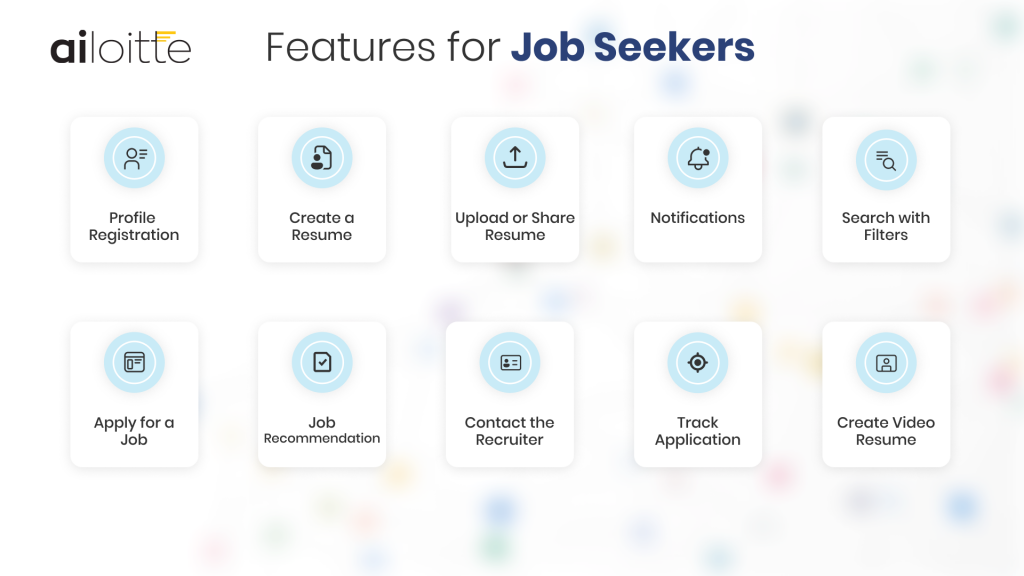
1. Profile Registration
Job seekers must be able to create their unique sign-in credentials and profile for their skills/experience.
2. Create a Resume
This feature helps create and update a professional resume on the job portal itself.
3. Upload or Share Resume
Job seekers can share their resumes directly with the company recruiter or the job application.
4. Notifications
Users can get frequent updates about job application status and newly available jobs.
5. Search with Filters
Users must be able to search for the most suitable jobs according to one’s skills and experience.
6. Apply for a Job
A feature that will help job seekers apply for any job with a single click.
7. Job Recommendation
The job recommendation feature will provide a specific list of jobs suited to the skills/experience of the seeker.
8. Contact the Recruiter
The applicants can directly contact the recruiter by email, call, or text with this feature.
9. Track Application
Job seekers can track the progress of their applications with this function. Progress updates can include Application Sent, Resume Viewed, Shortlisted, and Rejected.
10. Create Video Resume
A feature to create a video resume to discuss or showcase one’s skill/experience.
Recommended Apna Case Study for you:- APNA JOB Portal Case Study
Features for Employers
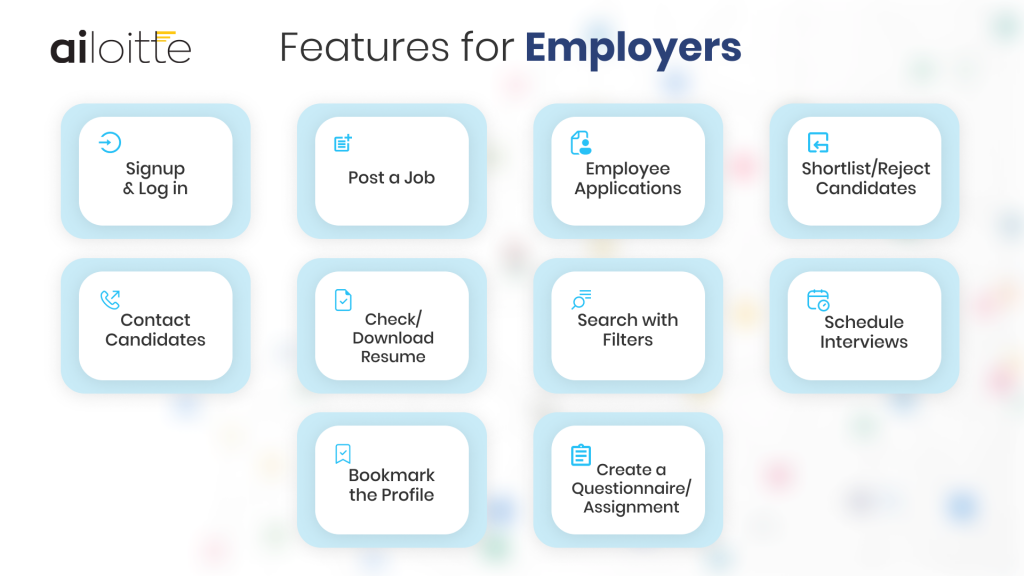
1. Signup & Login
Employers must sign up when they join and log in with their credentials every time they use your portal.
2. Post a Job
The employers can post job descriptions, required years of experience, educational background, eligibility, and CTC.
3. Employee Applications
Employers can keep a list of new and pending job applications.
4. Shortlist/Reject Candidates
A feature to shortlist or reject candidate applications.
5. Contact Candidates
Employers can directly email, text, or call the shortlisted candidates with this feature.
6. Check/Download Resume
The check and download resume feature helps employers evaluate candidates.
7. Search with Filters
Employers can search eligible candidates for their requirements using a search option with various filters like city, designation, education, and work experience.
8. Schedule Interviews
Employers can schedule telephonic, video-call, or in-person interviews with the candidates.
9. Bookmark the Profile
Recruiters must be able to bookmark the profile they hope to hire in the future but not at the moment.
10. Create a Questionnaire/Assignment
This feature helps employers create a specific questionnaire or assignment to test the candidates.
Recommended for you:- Hire Developers for Mobile App Development
Features for the Admin
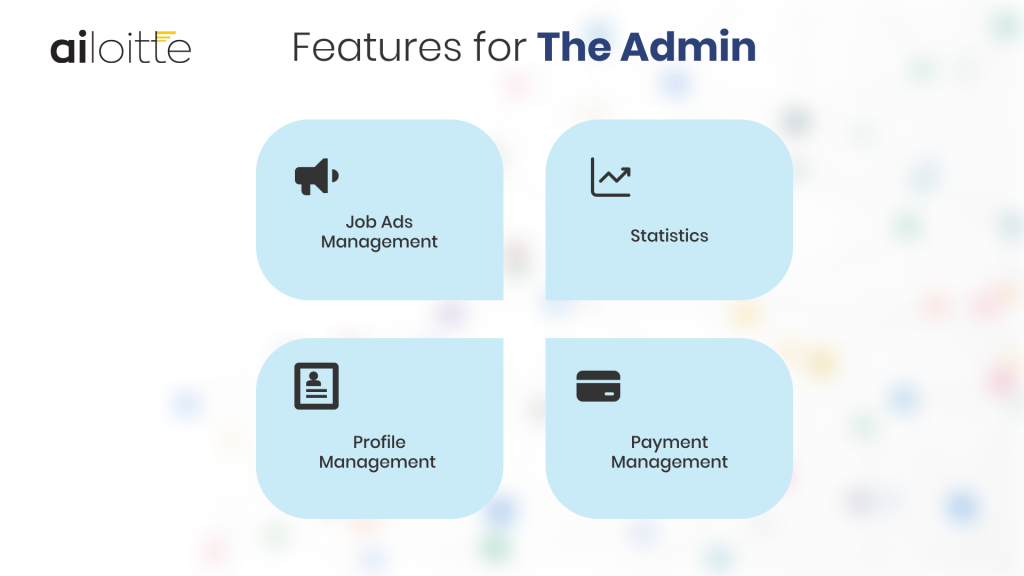
1. Profile Management
The admin can verify employer legitimacy and the jobs they offer. They can also ban and remove any profile that is fake or used for suspicious activities.
2. Job Ads Management
Admin can better monitor and manage thousands of ads about jobs with this feature.
3. Payment Management
This feature will help track all past, pending, and upcoming payments regarding in-app/website purchases in the job portal.
4. Statistics
The admin can monitor the activity of job seekers and employers on the portal. And keep a record of all the progress everyone has made.
Recommended for you:- Are you Looking for A Social Media App Development Company??
How to Create a Job Portal Like Apna?
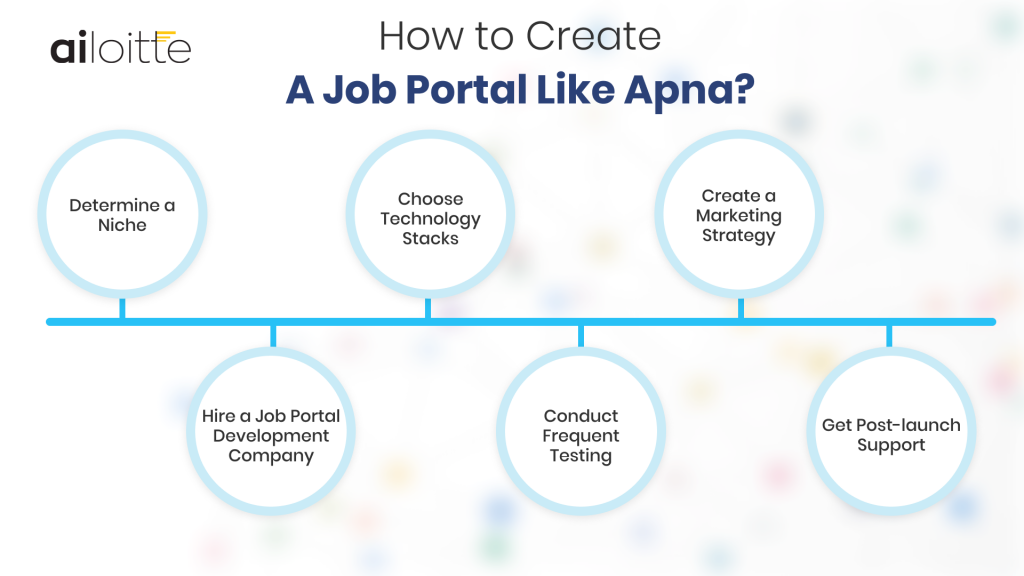
The Apna job website is just as influential as the Apna app. And Naukri offers the same with a user-friendly website and mobile app. It is something to keep in mind when you build your job portal.
You need to provide your job portal services on as many platforms as possible. It will help you reach a wider audience.
Here are some steps you can follow to create a job portal app like Apna/Naukri:
1. Determine a Niche
Apna chose a niche where it focused on non-English speaking job seekers.
You also have to determine your niche based on what you can offer best and how you can make it different or better than other job portals.
It’s best to avoid the general niche as it presents great competition with platforms like Linkedin and Indeed.
You can choose a specific industry during the job portal development and grow on that to ensure success.
2. Hire a Job Portal Development Company
A job portal development (Website/App) requires a team of professionals with certified experience.
Your team may need a project manager, UX/UI designer, backend developer, frontend developer, JavaScript developers, Android & Swift developers, Testing and maintenance Team, and Marketing expert.
You can make this process easy by hiring an onshore or offshore development company to make things easy.
An established job portal development company can create a helpful and influential platform for you like the Naukri and Apna job apps.
Such companies have experience with the intricate process of job portal app development.
They know how to create a job portal website or app that makes an impact and stands out. Experienced developers can also easily deal with the challenges associated with job portal website development.
You can also contact the Apna app developers directly. And get the best in the market to build your job portal.
3. Choose Technology Stacks
Here is the list of technology stacks you can use for the job portal development in Android, iOS, and web:
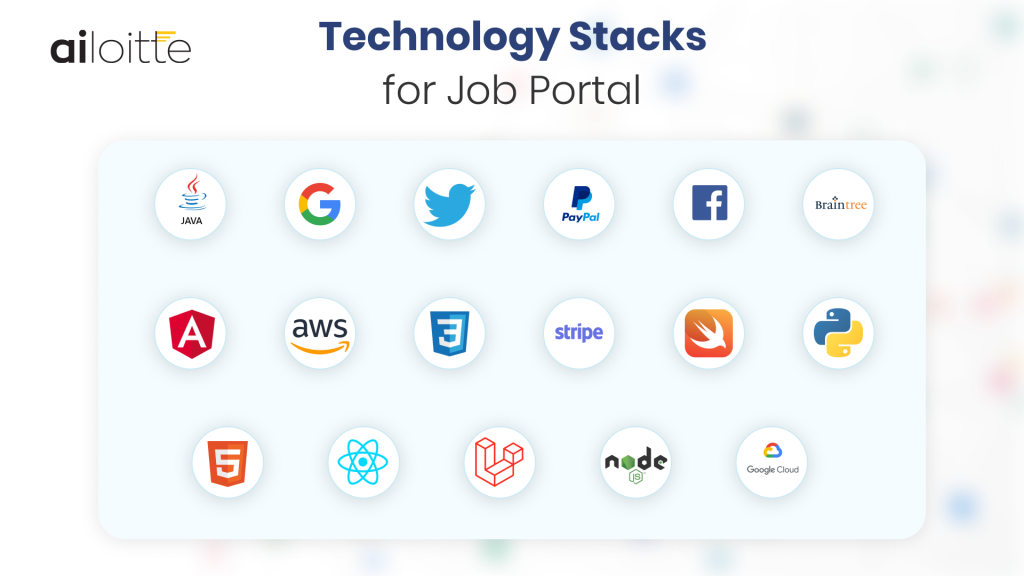
Technology Stacks for Job Portal
| Java | Swift |
| Angular | Python |
| CSS | Laravel |
| HTML | Node.js |
| React | Google Cloud |
| AWS | Braintree SDK |
| Stripe API | Paypal API |
| Google API | Facebook API |
| Twitter API |
You may not need all of these tech stacks for the MVP version of your portal. But make sure you hire experienced developers to pick the tech stacks required for your job portal.
4. Conduct Frequent Testing
The final version of your app or website will be up to the mark with frequent testing and improvements.
Feature, performance, manual/automation, and security testing are essential to detect and deal with any errors in your app.
5. Create a Marketing Strategy
A good marketing strategy is all you need when your app is ready for launch. The development can seem relatively easy compared to the marketing strategy you need for it.
You can make this easier by hiring an all-in-one development company that handles every process like development, launch, marketing, and post-launch support.
Tools like SEO, social media platforms, Google AdWords, and blogs are great ways to advertise your job portal.
You can also focus on one specific platform where most of your target audience will notice your product/service.
6. Get Post-launch Support
You must launch your job portal on the promised date through the Play Store and the Web.
You can incorporate customer feedback into your app/website after the launch. The website or app will also need updates and solutions for bugs.
A professional development company will also provide that service if you hire the right one.
Recommended article for you: Cloud Security Best Practices Checklist
How to Make Money with Job Portals?
Job portals like Apna and Naukri generate steady revenue with email marketing, database selling, premium subscriptions, and pay-per-click advertising.
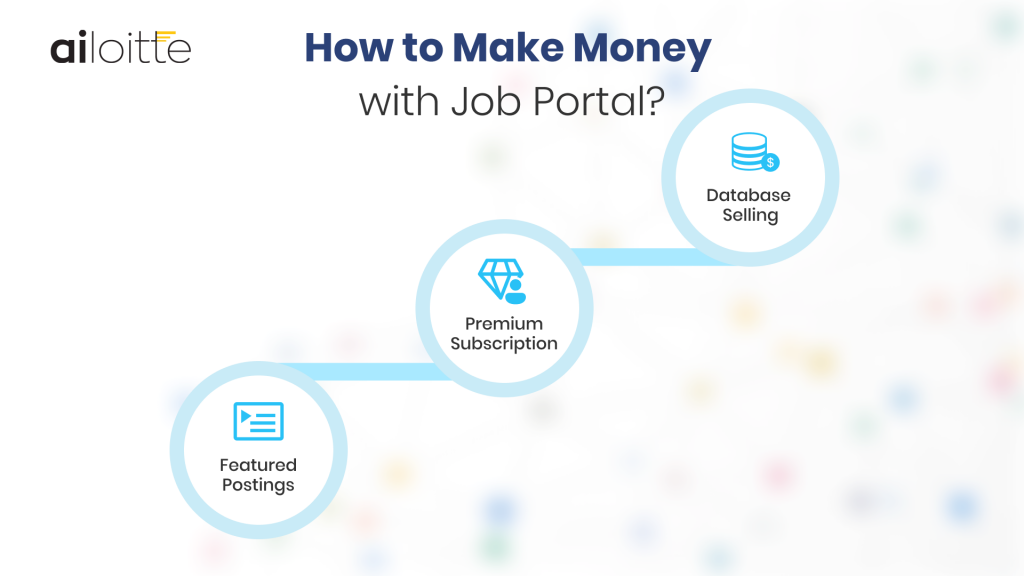
You can also do the same within a few months of your job portal’s success.
1. Featured Postings
Feature postings will require a specific payment from employers/organizations to their job requirements on the homepage or top of the list. Candidates will quickly notice such job postings and apply.
2. Premium Subscription
A premium subscription to your job portal will provide exclusive access to top jobs and candidates. You can sell this membership to both job seekers and employers.
Make sure you provide variety and discounts with your membership. For example Free trials, monthly subscriptions, and annual subscriptions with discounts.
3. Database Selling
You can collect a database of recruiters, companies, and candidates. And sell this database to recruiters and even candidates.
Some recruiters prefer a long list of candidates at once. It saves the trouble of posting a job requirement and waiting for the application.
You can make that easy by selling the candidate database to recruiters.
Many job portals generate substantial revenue with this monetization method.
Recommended article for you:- Make an app like Uber
Cost Breakdown of Job Portal Development
The development duration, design, features, and location of the developers are some common factors that affect the cost of development.
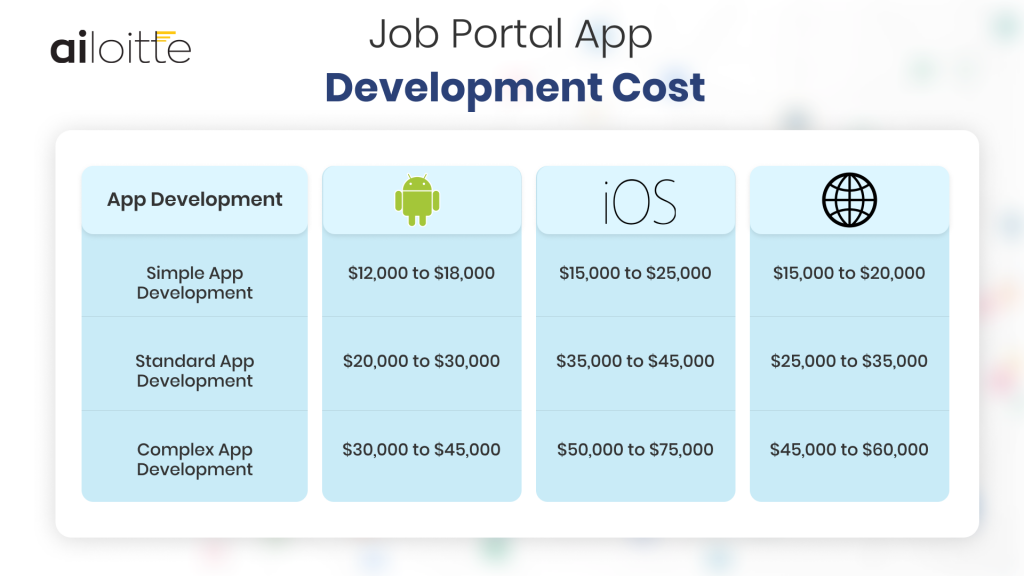
Developers based in India created the Apna app. And the standard job portal development cost in India for an Apna-like app is $15,000 to $40,000.
Here is a quick cost breakdown of job portal app development:
| App Development | Android | iOS | Web |
| Simple App Development | $12,000 to $18,000 | $15,000 to $25,000 | $15,000 to $20,000 |
| Standard App Development | $20,000 to $30,000 | $35,000 to $45,000 | $25,000 to $35,000 |
| Complex App Development | $30,000 to $45,000 | $50,000 to $75,000 | $45,000 to $60,000 |
Job portal app development costs will vary if you plan for additional features or a specific type of design in your app.
Recommended article for you:- Make an app like DoorDash
Frequently Asked Questions
Job portals usually make money by selling user databases, email marketing, premium subscriptions, and featured job postings.
The average cost to develop a standard version of a job portal is $30,000 to $45,000. It may vary with fewer or more feature requirements.
A job portal is a platform where recruiters can post job requirements. And job seekers can find and apply for those jobs. The platform works by providing some of these services for free and some for a cost.
Yes, without a doubt. According to Fortune Business Insights, The global online recruitment market value will see a CAGR of 7.1% in 2027. And reach a value of $43 billion compared to $28 billion in 2019.


















.png)
.png)
.png)



Your post emphasizes the value of creating multiple streams of income and diversifying revenue sources. It’s a wise strategy for financial stability and growth.
I’m impressed by the range of online platforms and marketplaces you’ve highlighted for monetizing skills and services. It opens up a world of possibilities for readers.
Your post discusses the potential of starting a coaching or consulting business, leveraging your expertise and providing personalized guidance to individuals or businesses. It’s a way to share your knowledge and make money.